talkSTEM is excited to partner with AT&T Performing Arts Center in joining UNESCO and hundreds of organizations around the world to celebrate the International Day of Mathematics (IDM) on March 14, 2020!
IDM’s theme for 2020 is: “Mathematics is Everywhere” – which is exactly the spirit of everything we do at talkSTEM! Our 4th annual Pi Day Math Festival at Sammons Park in the Dallas Arts District includes 30 other partner organizations all coming together to celebrate the power of mathematics in the arts, in the sciences, and in a wide range of human activity ranging from sports to journalism. We are excited to join with the many hundreds of organizations celebrating worldwide and to continue the work of creatively educating children everywhere through our work with our wonderful partners, through our videos on the talkSTEM YouTube channel, through the talkSTEM Learning Suite, and through our community activities in our home city of Dallas, Texas.
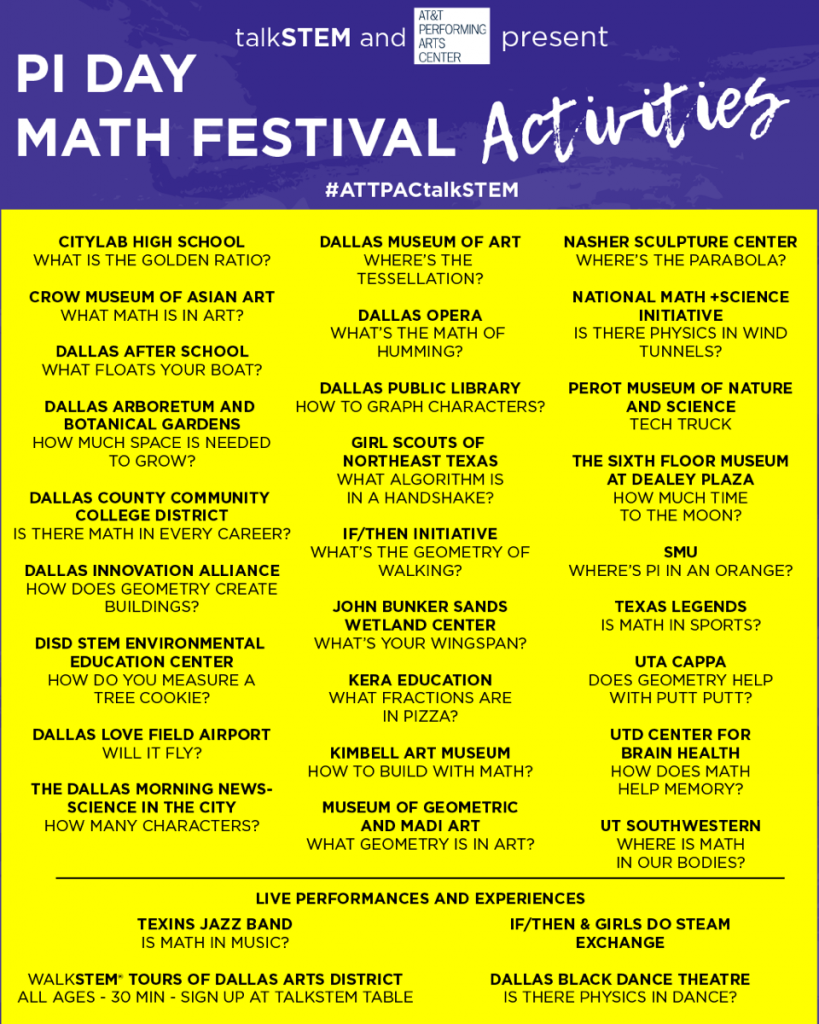

Looking back to our Pi Day Math Festivals from previous years, we have a great sense of pride in what we have accomplished in bringing together community partners from across the metroplex and are thrilled that the spirit of our work is now the focus internationally! Our very first Pi Day Math Festival was back in 2017.
Pi Day Math Festival 2019 brought over 1,000 attendees together to celebrate and we also had our unique STEM panel with leaders from arts organizations such as the Dallas Museum of Art, the Nasher Sculpture Center, the Dallas Black Dance Center, the Dallas Symphony, and the Perot Museum of Science and Nature – all focusing on varied careers in the arts that integrated STEM education.
From IDM’s brand new website in which they invite organizations globally to share their activities around March 14 activities:
Mathematics is everywhere in science and technology. A few examples:
The success of search engines comes from their brilliant mathematical algorithms. Mathematics help plan and manage economic and social systems enabling the move towards sustainable use of resources. We travel the world guided by precise mathematical calculations based on the position of the sun, stars and GPS satellites. We explore the inside of the human body through CT scans and MRI by building images out of numerical data through mathematical algorithms. We discover how human thought works by building AI software that can learn and make decisions through mathematic models. We photographed a black hole and continue exploring the edges of the universe with mathematics.
Mathematics is used to optimize transport and communication networks.
● Mathematics helps in understanding and controlling the spread of epidemics.
● Statistics and optimization are used in efficient planning and managing of health, economic and social systems.
● Mathematics helps designing electoral system that better represent the people’s will.
● Mathematics helps understanding the risks of natural disasters (floods, earthquakes,hurricanes) and preparing in advance.
Mathematics is essential to meet the UN Sustainable Development Goals. A few examples:
- Mathematics is a tool for development. Quoting Nelson Mandela (June 1990),“Education is the most powerful weapon which you can use to change the world.”Mathematics is an essential part of education, which is necessary for better jobs.
- Mathematics is used to model the global changes and their consequences on biodiversity.
- Optimization techniques and data analysis are needed in the move to a sustainable use of the world resources.
- Artificial intelligence is used to extract data from satellite images and draw maps of urban, industrial, agricultural and forest areas, where traditional data are missing.
- Mathematics education empowers girls and women to a better future.
- Numeracy and scientific literacy help every citizen to better understand the planetary challenges.
- Mathematics is everywhere in whatever you do. A few examples:
- Mathematics inspires artists and musicians: perspective symmetries, tilings, fractals, geometric curves, surfaces and shapes; patterns, scales and sounds in music.
- Mathematics is helpful in games of strategy from backgammon or chess to solving a Rubik’s cube or playing Awale.
- Mathematics is useful in budgeting.
- Nearly everyone uses some mathematical concepts: the builder, the farmer, theshopkeeper, the craftsperson, the athlete, etc.
- Tell me about some activity or area and I will tell you where mathematics is. A few examples:
- Mathematics is behind geolocation techniques, from navigations with the stars to GPS.
- Mathematics is behind the software of our smartphones.
- Mathematics makes your pension system sustainable.
- Mathematics makes realistic animation movies.
- Do you want to visit Mars one day? Without mathematics this will never be possible.
We could not agree more! We are grateful to all our partners in the area as well as those who collaborate with us from far away. We hope to see many of you at Sammons Park on Saturday, March 14 and for those of you who are not in the DFW area, look out for our photos and videos that we will be posting soon after! We also encourage all organizations – small or large – to stay tuned for the talkSTEM Math Festival Program that will launch later this spring. We encourage schools, after school groups, summer camps, museums, zoos, colleges, and more to use the Math Festival toolkit that we will be sharing in the hope that we can spread continued recognition and celebration of the “Math is Everywhere” message.
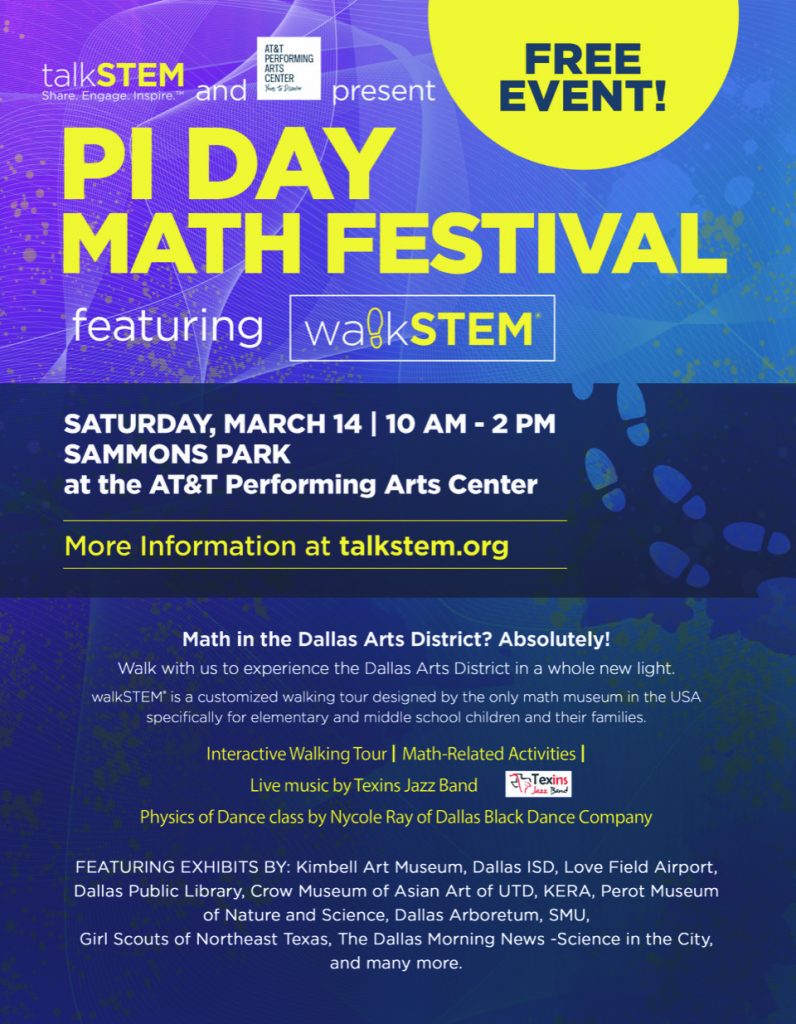

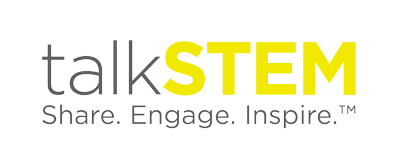
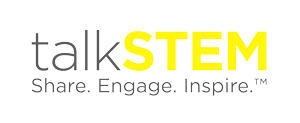
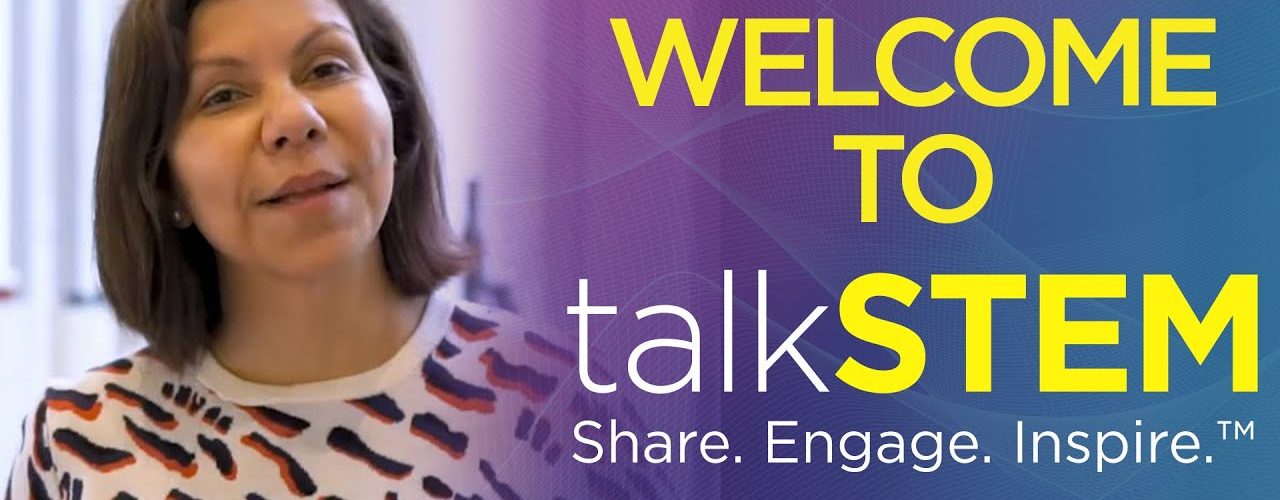

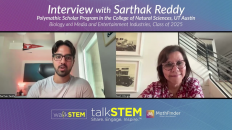
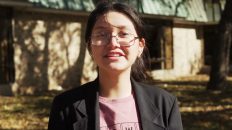


Add comment